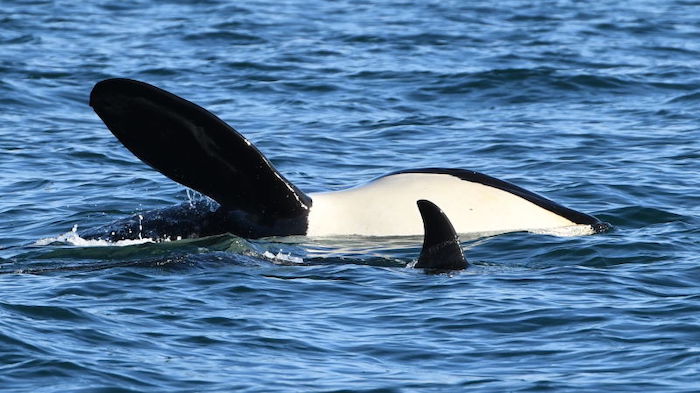forum
library
tutorial
contact

Farm Bureau On Board with Orca Recovery,
But Frets Over Regulatory Push
by Don Jenkins
Capital Press, January 30, 2019
|
the film forum library tutorial contact |

|
Farm Bureau On Board with Orca Recovery,
by Don Jenkins
|
Orcas are now the rallying point for previously proposed salmon policies.
 OLYMPIA -- Distress over orcas has invigorated a push to give the Washington Department of Fish and Wildlife more power to penalize landowners and immediately stop projects that might affect salmon.
OLYMPIA -- Distress over orcas has invigorated a push to give the Washington Department of Fish and Wildlife more power to penalize landowners and immediately stop projects that might affect salmon.
The Inslee administration, environmental groups and tribes say the department has too little authority to prevent rock-lined shores, especially in Puget Sound, from damaging fish habitat and starving orcas. As it has been in the past, the Washington Farm Bureau is leery about where this is heading.
The department already has broad authority to regulate projects on dry land, Farm Bureau director of government relations Tom Davis said.
"We support orca recovery," he told the House Agriculture and Natural Resources Committee on Tuesday. "But when it comes to regulatory expansion, we would just ask for caution.
Orcas are now the rallying point for previously proposed salmon policies. The hearing Tuesday was similar to a 2017 legislative hearing, when orcas were not mentioned.
At issue is how Fish and Wildlife enforces the law that prohibits property owners from damaging rivers and streams. In some cases, landowners must obtain permits from the department.
The Washington Supreme Court ruled last year that the department's authority does not end at the water's edge. The ruling affirmed that the department could require landowners to have permits before clearing brush or maintaining dikes.
House Bill 1579, sponsored by Democrats, would change the fine for breaking the state's hydraulic code to $10,000 per violation. The fine now is $100 per day. The bill also would allow Fish and Wildlife to issue stop-work orders and end the requirement that the department issue permits for rock walls to protect waterfront property.
The Legislature has considered those policies in previous years, but not adopted them. The policies are back this year and tied to orca recovery.
"This is an opportunity to address the plight of the southern resident orca," said J.T. Austin, policy adviser to Gov. Jay Inslee.
Fish and Wildlife Assistant Director Jeff Davis said the department has historically enforced permits through criminal proceedings and wants more authority to first seek voluntary compliance and then issue civil penalties.
"This is really a darn important bill from my perspective to protect orca, protect the investment you've all made in salmon recovery, as well as protecting our state and tribal fisheries," he told legislators.
The bill would declare any work that violates the state's hydraulic code a public nuisance, broadly defined as anything that annoys others.
Another provision would require smelt dippers to get a fishing license. Salmon eat smelt.
Davis said the Farm Bureau wasn't an "absolute no" on the bill. He said the Farm Bureau might support the bill if it specified which projects Fish and Wildlife has control over. Right now, he said, its jurisdiction is virtually unlimited.
"It goes from the top of Mount Rainier all the way down to the stream bed," he said. "The changes in this bill do not just apply to the Puget Sound and our concern about orcas. They apply statewide, so people who live all across the state have an interest in what the impact of increased regulation will do to them."
Related Pages:
Washington State v. Trump in Fight to Save Salmon, Orcas by Giulia C.S. Good Stefani, NRDC Blog, 2/8/19
Save Our Lakes by Marvin J. Entel, Lewiston Tribune, 2/3/19
River Advocate: Removing Dams Won't Help Orcas, Environment, Economy by Matthew Weaver, Capital Press, 1/18/19
learn more on topics covered in the film
see the video
read the script
learn the songs
discussion forum
